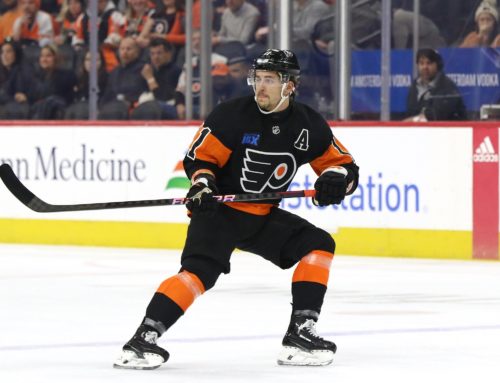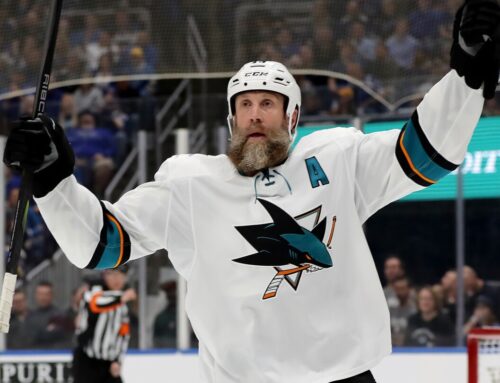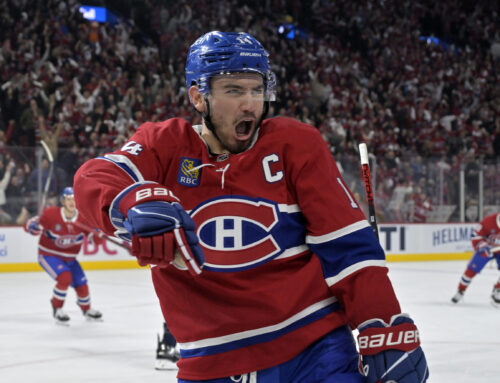
Stanley Cup Final, plus Mailbag: Wheeler, Save Percentage, and more…
I know I’m in the minority among Dobber writers for my Vegas pick to win the Stanley Cup. And I don’t know how much faith I have in my predictions after going 0-for-2 in picking conference final winners. But here’s a major reason behind my pick: I believe that the Stanley Cup Playoffs are a war of attrition. I’ve seen teams both win the Stanley Cup and lose the Stanley Cup simply because they were either able to outlast their opponent or they had nothing left. The Capitals have had to play four more games in their Cup quest than the Golden Knights, who have had some significant rest breaks between series.
Amazing but true: After Game 1 of the Stanley Cup Final, Jake Guentzel and Sidney Crosby are still tied for third (with Blake Wheeler) in playoff scoring with 21 points each. David Pastrnak, who we know absolutely exploded early against Toronto in the first round, is still seventh in playoff scoring with 20 points. Of course, Guentzel, Crosby, and Pastrnak were all eliminated in the second round.
Jonathan Marchessault, who is Vegas’ leading playoff scorer, is currently eighth in playoff scoring with 19 points. The Golden Knights have played just four more games than the Penguins in these playoffs. There are players from both the Golden Knights and Capitals that could still potentially pass Guentzel, Crosby, and Pastrnak, but are we not giving enough credit for star players who play only 2-3 rounds in the playoffs? Depends on your pool scoring system, of course.
So remember that the number of games played within each series also matters in a playoff pool. Those four extra games might not be beneficial for the Capitals in the series, but they help the playoff pool stock of Evgeny Kuznetsov, Alex Ovechkin, and company. An easy matchup in the first or second round might not help a top-ranked team’s players as much as you’d think, simply because of the games played.
News from the series: Whether you like it or not, Tom Wilson will not be suspended for his hit on Jonathan Marchessault in Game 1. Although the hit was clearly late and looked predatory, it didn’t seem to fit the textbook definition of a suspendable hit according to the league. I’m wondering if this was sort of an “even up” call by the league in case Wilson’s three-game suspension in the Pittsburgh series was viewed as too harsh. Teams tend to view a one-game suspension in the playoffs to be equivalent to a two-game or three-game suspension (or maybe more) in the playoffs.
*
No one player’s fantasy stock has increased more this postseason than that of Braden Holtby, who is number one on Tom Collins’ Top 10 list this week. Holtby should be back in the discussion of top 10 fantasy goalies, even after a subpar regular season. Then again, I get the feeling that you could pick goalies next season by throwing a bunch of names into a lottery drum. Okay, I won’t spoil the very measured and proven process that we have here at Dobber Hockey by suggesting that you be completely random.
But still: How will I know that a goalie that I would pick in the second round will be that much better than one that I pick in the eighth round? I expect a ton of debate and not as much variance than in the past between where individual goalies are ranked.
By the way, how much can a strong playoff performance actually improve a player’s fantasy value over the following season? You may want to read the article Playoff Heroes written by Rick Roos nearly a year ago, which really sheds some light on this topic. I’ll also put this out there, since I mentioned Guentzel earlier:
Guentzel career regular season: 0.66 PTS/GP
Guentzel career playoffs: 1.14 PTS/GP
We’re at a point in which we should be judging Guentzel more on his regular-season play than his playoff performance. Without regular first-unit power-play minutes, Guentzel’s upside is unfortunately limited. That is, unless there’s something to those Phil Kessel trade rumors. Then Guentzel keeper owners might have something to celebrate.
*
I didn’t have too much on my mind today, so I thought I’d ask you what’s on your mind. Thank you for your mailbag submissions. I’ll do my best to give you a quality answer. Here goes…
I’m very curious to hear people’s opinion on Wheeler moving forward. What type of production would you expect over the next couple of years?
— Ian Duval (@duvie27) May 29, 2018
The first thing that comes to mind with this question is Blake Wheeler’s age. This may not seem to be the case given the Jets’ group of young scorers, but Wheeler will turn 32 at the end of the summer. For an early first-round pick, Wheeler hasn’t taken a conventional path. He should be considered somewhat of a late bloomer, debuting in the NHL at age 22 and posting his career high in points at age 31. An age-related decline is inevitable and could begin next season, but to what degree?
About that career high in points: Wheeler has remained consistent in scoring between 20-30 goals over the last five seasons, yet he exploded for a career-high 68 assists, which was tied for the league lead. So with the bulk of the points coming in the form of assists, the question becomes whether the assists are primary or secondary. Well, you’ll be happy to know that 48 of Wheeler’s 68 assists were of the primary variety, which also led the league and was seven ahead of the next-highest performer in that category. So no major fluke or expected regression.
Having said that, 91 points will be a very difficult number for Wheeler to reach two seasons in a row. But with Mark Scheifele as his regular center (and hopefully for a full season this time), Wheeler should be fine. 80 points should be within reach next season, then probably something like 70-80 points the season after. Wheeler has missed just four games over the past five seasons, so those numbers should include virtually no injury discount.
*
Opinions on what Jake Trouba's and Colin Miller's RFA contracts might look like?
— jon (@jono6363) May 29, 2018
This will matter for fantasy purposes mainly if you are in a salary cap league, unless Jacob Trouba or Colin Miller cannot be signed by their respective teams.
Given his pedigree as a first-round pick and someone who wasn’t left unprotected in an expansion draft, Trouba will probably be the more valuable of the two. At the same time, the Golden Knights will probably have more money to play around with, so I wouldn’t be surprised if the dollar amounts turn out to be very close. Not that this is the only criteria that defensemen are evaluated on, but Miller’s career-high of 41 points this past season exceeds Trouba’s career high.
My best educated guess: $5 million per season at five years for Trouba, $4.5 million per season at four years for Miller.
*
League average save percentage dropped for the second straight season to .912 from a peak of .915 in 2015-16. Will this trend continue or will goalies claw back next season? What is the implication if scoring remains up?
— Stephen Laidlaw (@SteveLaidlaw) May 29, 2018
Oh hi Steve. My belief is that at the very least, save percentage should remain around the same, if not continue to fall. Here are two reasons that come to mind for me:
- Goaltending equipment changes. Pants were streamlined in February 2017, while slimmer chest protectors are expected to become mandatory for the 2018-19 season (see #28 from the latest 31 Thoughts). I can’t see this trend reversing itself if the NHL is actually taking measures to try to increase scoring, although the equipment changes may not have as much of an effect as the NHL wants.
- The Vegas model. With the Golden Knights three wins away from a Stanley Cup, many teams will no doubt attempt to learn and copy what made this expansion team so successful in such a short time (without being able to participate in an expansion draft themselves, of course). Expect teams to be more focused than ever on targeting players who have speed to burn, considering VGK’s up-tempo style.
What does this mean? Many actual goalie fantasy values will drop relative to scorers, particularly in leagues that award points for goals and assists and take away points for goals allowed. That doesn’t mean goalies will be drafted later, as fantasy owners will still be well aware that there are only so many starters. But should save percentages continue to decline, the bar will continue to be lowered as for what a quality start should be. Perhaps a quality start no longer requires a .917 SV% but instead only a .912 SV%.
*
Where would you rank Svechnikov and Zadina if this year had Hischier and Patrick instead of Dahlin?
— Alexandre Lussier (@lusshouse) May 29, 2018
Based on below, I’d place Andrei Svechnikov above the rest (save for Rasmus Dahlin, of course).
Data provided by @ProspectStats
Here are most of the OHL's notable draft prospects since 2002.
Svechnikov was on pace to score nearly 50 goals at even strength this season. But, you know, that WJC though. pic.twitter.com/CmayVI4PeO
— Steve Kournianos (@TheDraftAnalyst) May 3, 2018
Since both Filip Zadina and Nico Hischier played in the QMJHL the season before their draft year (on the same team, no less!) let’s compare their draft year totals:
Zadina: 57 GP, 44 G, 38 A, 82 PTS, 1.44 PTS/GP
Hischier: 57 GP, 38 G, 48 A, 86 PTS, 1.51 PTS/GP
This is a simplistic comparison, and I’d prefer to leave the actual draft rankings to one of the experts at Dobber Prospects. But based on this production, the values of Zadina and Hischier should be very close.
So of the players you’ve listed, I’d order them as follows:
Dahlin
Svechnikov
Hischier
Zadina
Patrick
*
For more fantasy hockey information, you can follow me on Twitter @Ian_Gooding.





 VAN
VAN UTA
UTA BUF
BUF NYI
NYI WSH
WSH MIN
MIN FLA
FLA CBJ
CBJ
